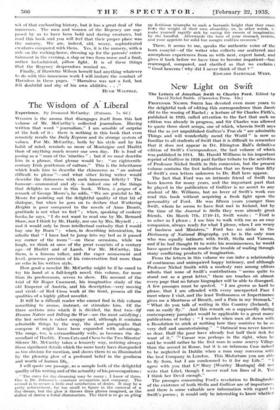The Wisdom of K Liberal
Experience. By Desmond McCarthy. (Putnam. is. 6d.)
WISDOM is the aroma that disengages itself from this last volume of Mr. McCarthy's collected journalism. Having written that word "journalism," I am sensible of surprise at the look of it : there is nothing in this book that even remotely recalls the Daily Express and its strange system of values. For Mr. McCarthy, both by his style and by his
habit of mind, reminds us more of Montaigne and Hazlitt than of anything much nearer our own day. He is fond of
posing as a "man of the 'nineties " ; but if we must describe him in a phrase, that phrase would be : "an eighteenth- century Irish gentleman of culture." This is the inheritance which leads him to describe the rhinoceros as "an animal difficult to please "—and what other living writer would describe the rhinoceros with such humorous felicity ? The humour—economical and sly—is indeed one of the things that delights us most in this book. When, a propos of a remark of George Moore's, he adds, "We are grateful to Mr. Moore for pointing out the delightful quality of that bit of dialogue, but when he goes on to declare that Wuthering Heights is poor compared to the novels of Anne Brontë, gratitude is not what we feel " ; when, speaking of cookery books, he says, "I do not want to read one by Mr. Bernard Shaw, nor I think by Mr. Hardy, nor one by Mrs. Meynell . . . and it would only be from intellectual curiosity that I would buy one by Ibsen " ; when, in describing intoxication, he admits that "I have had to jump into my bed as it passed my corner of the room "—on these occasions, while we laugh, we think at once of the great essayists of a century ago--of Hazlitt and of Lamb. For Mr. McCarthy, like' them, is a famous talker, and the eager amusement and level,' generous precision of his conversation find more than an echo in his written style.
How good a novelist Mr. McCarthy might be if he cared to try his hand at a full-length novel, this volume, far more than its predecessors, serves to show. His account of the trial of Sir Roger Casement, his imaginative study of the old Emperor of Austria, and his. description—very moving and vivid—of Red Cross work at the front, possess all the
qualities of a highly gifted novelist: -• It vill be a difficult reader who cannot find in this volume Something to amuse, instruct, .or stimulate him. Of the
three sections into which it is divided, the first two—Of Human Nature and Thrring the War—are the most satisfying;
the last section is rather scrappy and, although it contains admirable things by the way, the short paragraphs that compose it might have been expanded with advantage.
The range, too, is extraordinarily wide, as becomes the de- scend-ant of Hazlitt. From Cats and Chess to the Two Minutes' Silence Mr. McCarthy takes a leisurely way, noticing always those significant details which the more hasty have disregarded as too obvious for mention, and shows them to us illuminated by the pleasing glow of a profound belief in the goodness and worth- of human life,. -
I will quote one passage, as a sample both of the delightful quality of his uTiting add of the actuality of his preoccupations : "The cures for day-dreaming may be many : I know of three. One is Dr. Johnson's—constant occupation and company. The second is to secure a little real satisfaction of desire. It may be a petty achievement, far too small to figure in the carnival of a day-dream, but the glow it throws dims glories imagined, as the dullest of dawns a festal illumination. The third is to go on piling up fictitious triumphs to suoh a fantastic height that they crash frora the weight of their own absurdity, or, in other words, to make yourself rapidly sick by eating the sweets of imagination by the handful. Afterwards the tone of your stomach revives, and your appetite for solid but meagre realities recovers."
There, it seems to me, speaks the authentic voice of the born essayist—of the writer who collects our scattered and amorphous experiences from us with neat, expert hand, and gives it back before we have time to becorne impatient—tut rearranged, compared, and clarified so that we exclaim : "Good heavens ! why did I never think of that ? "
EDWARD SACKVILLE WEST.


















































 Previous page
Previous page